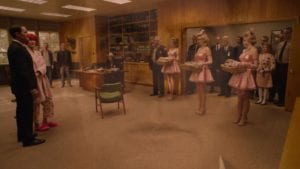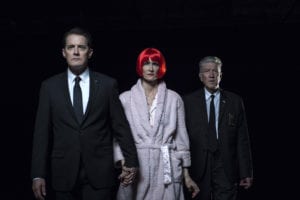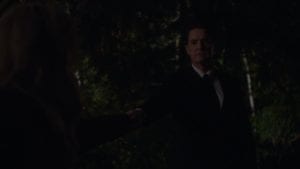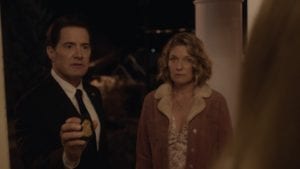The moment has come, one both dreaded and looked forward to. Across a period of 25 years we hadn’t only waited for the narrative’s return – we have also held our breath for a sense of finality. On a grand scope, the waiting game led to this two-part finale, wherein we could finally experience some atonement for the grief and hurt of the series’ cancellation. And that may just be the keyword in matters of intent and dynamic: Atonement. Is some redemption due for Cooper’s uncertain fate in the Black Lodge, for the executive interference that stunted the original run? Yes, there is. But now that David Lynch and Mark Frost are at freedom to do their art as they will it, they also get to choose the means and delivery. Here is the cue for controversy to rear its controversial head.
These days, it seems there are two variants within the Twin Peaks‘ fandom. Such is my observation, anyway. Those who look on the series with nostalgia, and those who do not. Considering the former, one may ask, what precisely did these people love from the original series? Was it the quirks, the coffee and cherry pie – notably absent (for the most part) in The Return? Was it the darkness and the horror – still alive and well? Whatever the case, some have proven blind to one fact: the creators have matured across these 25 years; especially David Lynch, having directed some of his darkest work, notably Mulholland Drive and Inland Empire, in this period. Expecting a catering to the past from Lynch and Frost is misguided, if not truly asinine.
Therefore, reception on The Return has been a dichotomy. But at no point may it prove as divisive as the spectrum of thoughts about The Finale proper. Some are quick to decry it; others praise it. Though I belong in the latter, I can clearly see a sensible reasoning to the controversy, as it highlights both the creators’ strengths and weaknesses. Nonetheless, one this is for sure: people will be talking about this for a while. In terms of dynamic, it’s all surprisingly succinct. But there is far more to say on what it suggests.
Brace yourselves.
Part 17
The Catharsis
The first part opens, unfortunately, with a weakness on part of the creators. Though Frost and Lynch are efficient storytellers (we wouldn’t be here if they weren’t), pacing escapes their dominion a few times. Far be it from me to say I, or anyone, could have done better, but nobody likes exposition. COLE reveals some information to Albert (and Tammy by proximity) which he’d withheld. Namely a plan created by Coop, Major Briggs and he to track and defeat an evil entity called “Jowday”, who eventually ended being called Judy. No wonder Jeffries didn’t want to talk about ‘her’ back in Fire Walk With Me. Therefore, this mysterious name that had accompanied us for a while reveals itself as the villain on a greater scope than either BOB or Coopelganger. We may get flashbacks from Part 8 and Part 14, with BOB’s ‘mother’ and the thing possessing Sarah Palmer, respectively.
After hearing Cooper’s message from last episode (and finding that Dougie Jones is Dale Cooper), the FBI folks take off towards Twin Peaks. Evil Cooper is also on the way, which spells a dreadful event to unfold; Naido herself is particularly restless, as she senses his approach. He finally arrives at Jack Rabbit’s Palace/White Lodge, where the Fireman transports him outside of the Sheriff’s Department. Cue intense foreboding at the danger this being represents for the likes of Harry, Lucy, Hawk, etc. Although Mr. C keeps the harmless facade of being Cooper, Andy is quick to pick up that this is not Cooper by the fact he refused a cup of coffee. From here on, the tempo is going to pick up dangerously with several events preceding the ‘boss fight’ at Sheriff Truman’s office.

First, Chad breaks out and holds Andy at gunpoint while he goes to free Naido from the cell. This leads Freddie to bust out as well in order to save Andy’s life and knock Chad out in the process. Meanwhile, Sheriff Truman receives a call from the real Cooper, who’s on the way, making for a tense silence as Booper reaches for his gun to kill Frank. An unlikely hero makes the save in the nick of time, though. Of all people to take out Mr. C, once and for all, it’s Lucy who shoots Evil Coop. Dale arrives shortly after, and everybody gathers in the Sheriff’s office to witness the Woodsmen’s gig, after which, BOB’s spirit emerges from the body. After a gruelling battle, Freddie fulfills his destiny by destroying BOB forever.
Dale putting the Owl Ring on his doppelganger’s finger seals the deal, effectively banishing him for good and giving us that resolution we so anxiously needed. There have been mixed views on the fact Freddie got to do the actual showdown rather than Cooper himself. But we ought to remember, this is not Hollywood. In face of what is to take place, it’s reasonable for a new, strapping young hero to do the physical dimension of the fray. This doesn’t remove the focus from Coop at all, because his work is just about to begin. COLE and the FBI arrive in time to see him through to the first steps.
No Way Back
Here is where things get a little complex. There is a definite sense of fatefulness, seeing all these characters gathered here, all united by two factors. They’re good people, and they’re all confused as fuck – there is plenty they don’t know. Some visual cues, like Cooper’s face as an ephemeral overlay over the scene lead the viewers to think they’re still in the dark about some things. Only Cooper himself seems to be in the know of the whole picture. Naido approaches him, and her facade crumbles to reveal her real self: she is the true Diane. Afterwards, Coop, Diane and COLE (The Lynchian trio par excellence) are transported to the Great Northern Hotel’s boiler room. Here be the source of that humming sound that mystified Ben, Beverly, James and Freddie.
Dale uses the hotel room key he got from Truman (originally facilitated by Jade) to open that door. After saying his farewells to both Diane and COLE, he crosses over into the dark unknown. Here, he meets MIKE, who once more speaks his “Fire Walk With Me” poem. His delivery is still as chilling as the first time, if not more so, and it sets the tone for the next encounter: Cooper meeting Jeffries. He will transport him to the place where he’ll find Judy, who apparently is the symbol represented on both the Owl Ring and Evil Coop’s card. Now, it’s not actually a place, but a date – February 23, 1989. The last night of Laura Palmer’s life. The scene is a black and white rendition of Laura riding with James in Fire Walk With Me.

As opposed to usual feeling of loneliness and tragedy that comes with “Laura Palmer’s theme”, seeing Cooper here, preventing her from meeting Leo and Jacques, imbues it with hope. This is especially true considering she’d seen him in a dream, facilitated by the painting she got from Mrs. Tremond/Chalfont. The colours seep into the scene at the moment she grabs his hand. As a consequence her death is erased from time. So when Peter Martell goes to the shore that morning, he’ll find nothing dead, wrapped in plastic. The tragedy is averted, but something occurs as a consequence. No, I don’t mean a time paradox. In response to Cooper’s intervention, a scorned Sarah Palmer throws a fit, stabbing Laura’s homecoming portrait.
Laura disappears out of existence with a scream as Cooper leads her out of the woods. This won’t be nearly as easy as we thought, will it? This episode comes to a close with Julee Cruise singing “The World Spins“, which we may ruefully remember from Season 2, Episode 9: Maddy Ferguson’s death. That was a tragic failure to prevent a death. Will this prove different?
Part 18
Another Place
All throughout this final episode, there is a strong sense of inescapability. This is first highlighted by the tulpa MIKE creates in the Black Lodge, which ends up filling the gap in Janey-E and Sonny Jim’s lives after Cooper left. This is one end tied for good. After Laura’s disappearance, Cooper finds himself back in the Black Lodge where he has some brief and cryptic encounters with MIKE, the Arm, and Leland – who urges him to find Laura. Dale comes out of the Lodge into the woods, and finds Diane who asks if it’s really him. This question first come off as surprise giving in to relief. However, we’ll notice that from here on out, there’s something different about Cooper. While he is good at heart, he does exhibit some traits from his doppelganger, namely a disposition for violence and a distant tone while speaking.
Together, Cooper and Diane embark on a very special road trip. Their destination is not a place they actually know, rather they’re following the Fireman’s reminders from Part 1. Dale stops the car precisely on mile 430, after which, there won’t be any chance to come back. Diane’s silent anxiety prior to this moment is an ominous hint on what they’re heading into. The sensation is further enhanced by Lynch’s long takes, which help build up tension, and then some. After ‘crossing over’, we find Cooper driving a lonely road at night; unnerving seeing as how closely we’ve associated the image with his evil couterpart. Eventually they stop at a motel for some rest and love making. Here is where things get heavier.

Motion-wise, sexual intercourse between Cooper and Diane is no different to that of willing people who crave each other. But closer attention on Diane’s body language and expression makes all the difference. There doesn’t seem to be any actual pleasure as she rides him; it’s mostly momentum. In the process, she covers his face with her hands, and her anguished face is looking straight at the ceiling. This is not an act of lust, but a desperate act of healing. Diane is desperately trying to reconcile the experience of her rape at the hands of her lover’s doppelganger. The fact that “A Prayer” by The Platters is playing on the background only adds to the contrast of act and mood. If not for the fact this song featured on Part 8 just before the Woodsmen’s mantra, it would fit perfectly for some fucking.
But we can no longer dissociate both song and event in this series. In a similar way, Diane struggles to dissociate Cooper and Mr. C as two separate individuals. As Cooper wakes up alone the next day, it seems the pain of the trauma was too much, so Diane leaves the journey, leaving him a farewell note. In this note, she acknowledges him as Richard and herself as Linda. Thus we got the second reminder from the Fireman. Remember Richard and Linda. This proves Richard Horne a red herring to the theory there was a second Booper kid running around by the name of Linda. But more importantly, it’s a hint that in this ‘world’ or ‘continuity’ sans Laura’s murder, they’re different people. Regardless, Cooper has to go on by himself.
The Scream
Dale Cooper drives through Odessa, Texas on the lookout for something. Soon enough, he finds a clue on a Coffee Shop: Judy’s, of course. His demeanour, actions and speech are all a disturbingly strong shade of Mr. C in this place. After telling off three cowboy dudebros harassing the waitress (Francesca Eastwood), he disarms them all with scary-vicious competence, a tint darker than ‘Dougie’ disarming The Spike. He then basically holds EVERYONE at gun point, while demanding the waitress give him the address of the other waitress, who hasn’t come to work lately. I swear, this kinda sounds like the Terminator looking for Sarah Connor. Still, he kills nobody; Coop’s still Coop – he’s anti-hero Coop.
So, ‘C-800’ arrives at the address. The visual cue of the paramount importance to this place is the Utility Pole number 6, which we’ve seen several times during The Return and in Fire Walk With Me. There is audible electricity crackling in case we didn’t remember the appearances above. And who’s that at the door, if not Laura Palmer, having aged as she would have, had she not been murdered? Except, she is not Laura Palmer – her name is Carrie Page, which falls in line with ‘Richard’ and ‘Linda’ instead of ‘Dale’ and ‘Diane’. Cooper doesn’t go Kyle Reese with the whole “come with me if you want to live”, but he does tell her he needs to take her to Twin Peaks as he believes Carrie is truly Laura Palmer.

Carrie acknowledges that she’d tell him to leave, if not for the fact that she’s in a pickle, needing to get out of Texas quick. Yes, a dead body in her living room seems a sensible reason to skip work and put some distance from her current location. So, Dale and Carrie embark on the second bit of the road trip – a lengthy drive up north. Upon arrival, Coop locates the Palmers’ house, but finds that Carrie doesn’t recognise the house, and the Palmers don’t live here. In fact, the house’s new occupants have never heard of anyone of the Palmer family. There is no link whatsoever with the narrative of Twin Peaks here, much to Cooper’s confusion. None, except for one. It was a Mrs. Chalfont who sold the house to the current owner, Alice Tremond (Mary Reber).
Fealing defeated, Cooper wonders aloud what year is this. You can tell the desperation in his voice. Carrie then hears Sarah Palmer’s voice calling for her from within the house, thus bringing the memories of all the horror back into her mind. As Carrie screams in terror, the lights on the house shut down, and the scene fades to black, bringing The Return to an end, and a flood of questions as immediate reaction for the viewer. There is no performance on the Roadhouse to nurse our feelings as the credits roll. Only a dismal melody with an opaque image of Laura whispering on Cooper’s ear.
It’s an ending, but what kind of an ending is this? Happy? tragic? good? bad? uncertain? gratuitously confusing? lazy? astounding? I’ve heard arguments for all these adjectives. My personal input: brilliant. I need not justify my opinion (I’ve gotten shit because of it by some zealous fans on Facebook groups) but I’ll give my personal thoughts.
Final Thoughts
What was my personal reaction at seeing the finale for the first time? Bewilderment, and I’m sure I’m not alone on this. I knew it would be naîve to go in expecting nothing but a wholesome triumph for the good guys, and a suitable comeuppance for the evildoers. In a way, we did get that (at a huge price) – but the setting had never been (even in the original run) a mold for a traditonal story of good vs. evil. It could never be that simple; it’s not Game of Thrones, for fuck’s sakes: there’s no plot armour, there’s no guy gets girl (though it’s incest, which is okay now, for some reason). Thus I was prepared to acknowledge my essentially humble position as a viewer. For I don’t hold the cards, the creators do.
I dared to feel surprised, which is precisely what defined my experience of the original run. Not even on second watch, but merely on actually reflecting upon what I watched, I got a sense of clarity on the Finale. The mood was bleak, but there is plenty in there to read triumph in Cooper’s journey. Then, I reasoned that Cooper was the Magican from MIKE’s monologue. Braving a broken temporality, a duality of worlds, he longed to see the way to defeat evil, to defeat Judy. Therefore, he fire-walked through peril and doom for this purpose. That’s what I extrapolated then, and my understanding only got more nuanced, more open to explore new interpretations.

I understood that, at its core, the narrative of Twin Peaks is not about eating donuts with coffee; it’s about carrying a light into some of the darkest depths of human existence. Outside of it, the constant subversion to expectations on entertainment back in the early nineties, and now in the 21st century are whole delight of its own. Thus, Twin Peaks: The Return expanded upon the mechanisms of storytelling, explored new depths and altogether, did more than replicate the experience of those magical first seasons. It surpassed it. Now, one would be hard pressed to find a series with no narrative faults, and The Return isn’t one such series. It does have its flaws in narrative and pacing, and unexploited imagery and characters (What the fuck happened with Audrey?). But the graces definitely outshine the flaws.
Now, many series give the viewer a tightly packed outcome on the final episode. But not many leave enough room for either a new season that might or not happen, and could still hold on its own if it didn’t. And few still engage the audience’s imagination and reasoning like Twin Peaks did across the entire run. Across the series, film and books’ length, Lynch and Frost have given us the hints, the motifs and cues to generate discussion and theorise. Therefore, we can partake of the discourse in a far more active way than we may with an air-tight finale. Encouraging this kind of communcation with the medium is something that has been attributed to the likes of George Lucas (when his reputation was worth something). Thusly, we can expect fan theories and fanfics galore. Here’s a personal favourite.
Regardless of the polarity of opinion, this will be in the tongue and head of the viewers for a while. It’s the kind of thing that invites you to rewatch. Not merely to experience it again, but to rethink it, and discover new things beneath the image. Through intent, delivery and aftermath, Twin Peaks: The Return has proved exceptionally ambitious. Having reached the ending, was it worth it, all those 25 years? Of course it was.
Thank you for reading.
Twin Peaks: The Return – Parts 17 & 18 Credits
Directed by David Lynch
Written by Mark Frost and David Lynch
In loving memory of Jack Nance
All images are courtesy of Showtime

